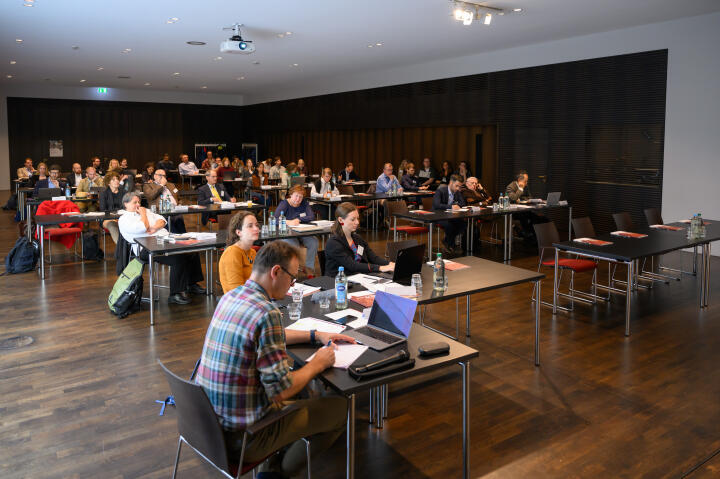Exploring processes of legal standardization
Report on the second annual conference, 25-27 September 2023
by Benjamin Seebröker
For a second time, the Kolleg invited scholars from different disciplines and from all over the world to an annual conference in Münster. The conference aimed at shedding light on different processes of standardization or unification (Vereinheitlichung) in law, which was also the annual theme of the past academic year at the Kolleg. It brought together scholars from many disciplines such as legal history, anthropology, Islamic and public law, and history, who are using different approaches and examples to examine the complex phenomenon of legal standardization. The conference explored the various modes of standardization or unification that can be observed in different epochs and societies and that can take effect in law as well as in legal practice. Although it is often perceived as the less imperfect counterpart of legal pluralism, Ulrike Ludwig stressed in her opening talk that legal unity, as well as legal plurality, is never absolute. Depending on the perspective and the focus of research, we can always spot plurality within unity and unity within plurality. Additionally, we have to keep in mind that processes of standardization or efforts to create unity within social groups, societies or geographical entities can lead to new forms of plurality. This interrelatedness of plurality and unity in law and legal practice lies at the core of the Kolleg’s approach.

Fellows, members and alumni of the Kolleg, together with scholars from Münster and from abroad, discussed an extraordinarily wide range of topics, encompassing areas of Europe, Africa, Latin America, as well as East Asia and reaching from Roman antiquity to medieval and early modern times right up to the 21st century. In nine talks, scholars did not only examine isolated processes of legal standardization but also paid much attention to the question of how they were intertwined with political and social events, shifts and long-term developments. The talks were distributed across three sections, each focusing on a key aspect of legal standardization: legislation, courts and scholarship.
The section on legislation delved into the historical context of unified laws as a means to consolidate sovereignty and fulfill representational purposes. This was demonstrated by Elesemieke Daalder (Münster) using the examples of Justinian’s Corpus Iuris Civilis in the Roman Empire, a monumental effort in legal codification, and by Sarah Albiez-Wieck (Münster) using the attempts to reform the fiscal and tax system in the Spanish colonies in Latin America. That efforts of standardization do not need a strong, centralized authority, however, and that standardizing law can include recognizing local laws, became clear in Andrea Nicolas’ (Berlin/Münster) talk on legal standardization efforts in Oromo/Ethiopia.

In the subsequent section, Marco Cavarzere (Venice) provided valuable insights into attempts to standardize court procedures despite heterogeneous law, using the example of papal courts in early modern times. In an intriguing analysis of the judiciary in Angola circa 1800, João Figueiredo (Münster) introduced the metaphor of a normative fabric. Angola exhibited a distinct legal structure compared to Europe, as it played a crucial role in the supply chain for the slave trade, a role that needed preservation. The close connection between legal unity and plurality became particularly clear in Nora Markard’s (Münster) presentation. She observed that human rights have to be adapted for specific local or cultural contexts in order to be applied, leading to a plurality in the application of the uniform human rights.
The last section explored how scholarship could contribute to the standardization of law and legal practices. Beginning with the example of medieval canon law, Stephan Dusil (Tübingen) highlighted the significant role the Decretum Gratiani played in providing a uniform marriage law. He also made clear, however, that there remained substantial leeway for adaptations in the practical application of the decretals. Shifting to the 19th century, Marju Luts-Sootak (Tartu) offered a nuanced perspective on the development of private law in the Baltic governorates and the work of Friedrich Georg Bunge. In contrast to other codifications of private law in Europe during this time, his work was not an attempt to unify private law but to compile the different provincial laws of Swedish Estonia, Swedish Livonia and the Duchy of Courland and Semigallia. The last presentation by Kenichi Moriya (Osaka) on the legal modernization in 19th-century Japan reiterated for all participants that the concept of law is understood very differently across societies and that cultural contexts are of paramount importance to comprehend how and why processes of legal standardization took place under certain circumstances.
Annual Conference 2023

This indicates that the interdisciplinarity and the wide range of topics were sometimes challenging. Occasionally, scholars from different fields use the same term but mean different things, emphasizing the necessity of interdisciplinary dialogue and collaboration to broaden our insights into the complex relationship of law, societies and processes of legal standardization. But overall, the lively discussions have been very fruitful and thought-provoking, precisely because there were so many different disciplines involved. The conference proved to be a stimulating platform for scholars to explore and discuss the intricate processes of legal standardization and unification as well as their interconnectedness with political, social and cultural factors.
A pleasant and very friendly atmosphere also prevailed outside of the academic conference programme during the breaks and the joint dinners, filled with enthusiastic conversations. New acquaintances and current as well as upcoming research projects were discussed. Undoubtedly, the results of the rich exchange at the conference will further stimulate the work at the Kolleg in the future.









